Eucalyptus essential oil has wonderful multi-faceted medicinal properties. So it's not surprising that it's used widely in many over-the-counter products available at your local grocery store or pharmacy including chest rubs for colds and congestion, cough and cold medicines, sore throat sprays, mouthwashes, inhalers, soaps, rash creams and topical pain relievers, just to name a few.
Native to Australia, and used for centuries by Aboriginal tribes for its healing properties, the eucalyptus tree, classified as Eucalyptus Globulus, is now grown world-over including China, India (where it is better known as Nilgiri oil), some parts of Europe and South Africa. The medicinal properties come from the leaves which are dried, and then crushed and distilled to extract the strong, colorless and potent essential oil.
Eucalyptus essential oil boasts many benefits including:
- Anti-inflammatory
- Antispasmodic
- Decongestant
- Deodorant
- Disinfectant
- Antiseptic
- Antibacterial
- Insecticidal
- Stimulant
- ...and more!
Here are top 20 health benefits and medicinal uses of Eucalyptus Essential Oil as well as tips and recipe blends on how to use this handy, multi-purpose healing oil:
1. Eucalyptus Oil for Cold and Congestion
 Eucalyptus oil is known for its anti-viral and anti-bacterial healing properties. A 2010 study suggested that, "Eucalyptus oil (EO) and its major component, 1,8-cineole, have antimicrobial effects against many bacteria...viruses, and fungi." And that, "...surprisingly for an antimicrobial substance, there are also immune-stimulatory, anti-inflammatory, antioxidant, analgesic, and spasmolytic effects."
Eucalyptus oil is known for its anti-viral and anti-bacterial healing properties. A 2010 study suggested that, "Eucalyptus oil (EO) and its major component, 1,8-cineole, have antimicrobial effects against many bacteria...viruses, and fungi." And that, "...surprisingly for an antimicrobial substance, there are also immune-stimulatory, anti-inflammatory, antioxidant, analgesic, and spasmolytic effects."
The study recommended that vapor inhalation was an effective way to relieve congestion. Inhaling the strong aroma of eucalyptus oil helps to loosen phlegm and alleviate congestion associated with the common cold, flu or more severe conditions such as bronchitis.
How to use Eucalyptus oil for cold and congestion:
1. Steam inhalation: Add 10-15 drops of eucalyptus oil to a bowl of boiling water, place a towel over your head and breathe in the potent vapors for 5-10 minutes. The hot steam helps to thin and thereby drain mucus in the nasal passages and the decongestant properties of eucalyptus help to relieve cold symptoms.
2. Use in a Diffuser: Add several drops of eucalyptus oil in your diffuser and breathe in the medicinal vapors all night long.
2. Eucalyptus Oil for Cough
 Eucalyptus oil's decongestant properties can help to clear your chest by making your cough more productive. There's nothing more annoying than a hacking cough with nothing coming up. Inhaling the vapor or applying a eucalyptus oil infused rub can help in loosening mucus, so that when you cough, the thinned mucus can be expelled out of your chest.
Eucalyptus oil's decongestant properties can help to clear your chest by making your cough more productive. There's nothing more annoying than a hacking cough with nothing coming up. Inhaling the vapor or applying a eucalyptus oil infused rub can help in loosening mucus, so that when you cough, the thinned mucus can be expelled out of your chest.
Many popular over-the-counter rubs contain eucalyptus and other cough suppressing substances.
Below is a home-made recipe for an all-natural rub (this is an excellent alternative to the chest rubs available in pharmacies that contain petroleum jelly).
Eucalyptus oil all-natural rub for coughs:
1/2 cup coconut oil or olive oil
2 tablespoons of beeswax pastilles
20 drops of Eucalyptus Oil (contains the active substance Eucalyptol, which acts as a cough suppressant).
15 drops of Peppermint Oil (contains the active substance Menthol, which makes it easier to breathe by opening up nasal airways).
Slightly melt beeswax and carrier oil over a double boiler and add essential oils. Stir well, pour in a container (small tins work well) and let set. Use as needed.
3. Eucalyptus Oil for Hair Nourishment
 Need some instant hair nourishment? Moisturize your hair with a few drops of eucalyptus oil blended with a carrier oil like coconut oil (which is also an excellent hair moisturizer!). The active ingredients in eucalyptus oil help to stimulate hair follicles (the tiny holes where hair grows from) by stimulating blood vessels to constrict. This in turn gets more blood flow to the follicles and encourages healthy hair development.
Need some instant hair nourishment? Moisturize your hair with a few drops of eucalyptus oil blended with a carrier oil like coconut oil (which is also an excellent hair moisturizer!). The active ingredients in eucalyptus oil help to stimulate hair follicles (the tiny holes where hair grows from) by stimulating blood vessels to constrict. This in turn gets more blood flow to the follicles and encourages healthy hair development.
How to use Eucalyptus oil for hair nourishment:
4 tablespoons carrier oil, such as olive oil or coconut oil
100 drops or 1 level tsp eucalyptus oil (20:80 essential oil to carrier oil ratio)
Mix eucalyptus oil and olive or coconut oil and gently massage the blend into the scalp. Comb your hair to further stimulate blood flow. Apply on the hair about an hour before taking a shower. Wash off with shampoo/conditioner.
4. Eucalyptus Oil for Itchy Scalp
 Do you suffer from a dry, itchy scalp? Eucalyptus oil can help. Find instant itch relief by trying the recipe below:
Do you suffer from a dry, itchy scalp? Eucalyptus oil can help. Find instant itch relief by trying the recipe below:
4 tablespoons regular white vinegar
100 drops or 1 level tsp eucalyptus oil
4 cups water
Mix all of the above and rinse your hair with the blend making sure the liquid is evenly distributed across your scalp. Shampoo and condition your hair immediately to experience quick cooling itching relief.
Combining eucalyptus oil with neem oil (an excellent oil for treating dry, itchy scalp) is a great way to nourish and moisturize the hair.
1 teaspoon neem oil
4-5 drops eucalyptus oil (also helps to mask the strong smell of neem oil)
3 tablespoons coconut oil
Blend and massage into the hair and scalp. Wash after a few hours, or leave overnight for better results.
5. Eucalyptus Oil for Lice
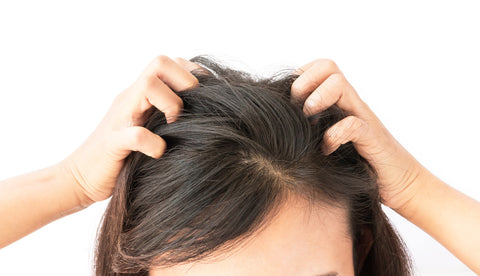 There's nothing more embarrassing or annoying than having your scalp infested by head lice! Eucalyptus oil is a natural insecticide and many commercially available head lice sprays actually contain essential oils such as tea tree and eucalyptus (along with many harsh chemicals).
There's nothing more embarrassing or annoying than having your scalp infested by head lice! Eucalyptus oil is a natural insecticide and many commercially available head lice sprays actually contain essential oils such as tea tree and eucalyptus (along with many harsh chemicals).
The next time you get an outbreak of head lice try this home-made blend that not only helps to nourish the hair with the moisturizing properties of eucalyptus oil but will also keep the tiny critters out of your hair:
3ml eucalyptus oil
2 tablespoons shampoo
1 teaspoon neem essential oil (Lice hate the strong, bitter, pungent smell of neem and neem oil contains the active ingredient azadirachtin, an insecticide, which prevents the reproduction of lice)
Alternatively, in a regular 60 ml shampoo bottle add 6 ml of eucalyptus oil and 2 teaspoons of neem oil. Shampoo hair and cover with a plastic shower cap for 10-15 minutes. Remove shower cap, wash hair and towel dry. Comb through hair with a lice comb (fine nit comb) which will help to catch the eggs.
Note: Please use the above recipe with caution if using it to treat children. Eucalyptus oil is strong and potent so make sure children do not get it in their eyes or mouth.
6. Eucalyptus Oil for Keeping Bugs Away
 Want a natural and healthy alternative to chemically toxic bug sprays available commercially? The drug store contains many popular insect repellant options, but most contain DEET, which although approved by health agencies, has questionable health concerns.
Want a natural and healthy alternative to chemically toxic bug sprays available commercially? The drug store contains many popular insect repellant options, but most contain DEET, which although approved by health agencies, has questionable health concerns.
As an effective alternative to store bought insect repellant, here's a recipe for a natural easy to make at home bug spray that not only smells great but keeps the bugs away.
1. Eucalyptus oil bug spray:
20 drops eucalyptus oil or lemon eucalyptus oil
10 drops lavender oil or cinnamon oil
Natural witch hazel
Boiled water (or distilled water)
Fill an 8oz spray bottle half-way up with boiled/distilled water. Fill the rest of the bottle with witch hazel. Add the essential oils. Spray!
It is recommended to use this all-natural spray on clothing (especially when using on children) than directly on the skin.
2. Keep pests away: Ants, cockroaches and pests detest the smell of eucalyptus oil. Soak a few cotton balls with 3-5 drops of eucalyptus oil and place them in the pest-infested areas.
7. Eucalyptus Oil for Cold Sores
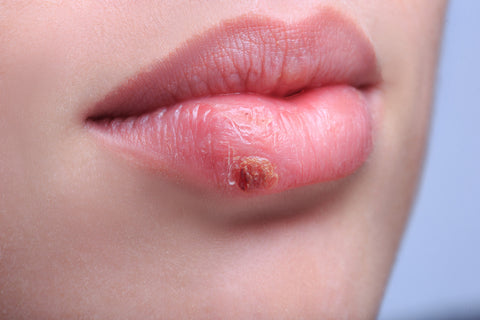 For most people who've had a cold sore, it's likely the painful, unpleasant blisters will reoccur, so when you feel that tingling, burning sensation around your mouth, take action with this effective home remedy below and kill a cold sore in its tracks.
For most people who've had a cold sore, it's likely the painful, unpleasant blisters will reoccur, so when you feel that tingling, burning sensation around your mouth, take action with this effective home remedy below and kill a cold sore in its tracks.
Studies suggest that the effects of eucalyptus oil against the "herpes simplex virus," responsible for causing cold sores are promising, so it's no surprise that over-the-counter balms for cold sores contain essential oils, including eucalyptus oil.
If you feel a cold sore coming on or need relief from a cold sore try the remedy below:
1 drop Eucalyptus Oil
1 drop Peppermint Oil / Tea Tree Oil
2-3 drops of a carrier oil such as coconut oil or olive oil
Mix all of the above and apply it to the sore 3-4 times a day. Speed up healing and feel instant cooling pain relief!
8. Eucalyptus Oil for Diabetes
There's not enough research at this point to show how eucalyptus oil works in reducing blood sugar but a 2010 study conducted on rats suggests that the "treatment of diabetic rats with eucalyptus for four weeks compensated the diabetic state and significantly reduced blood glucose levels."
It's still not absolutely clear how eucalyptus oil works but since it might potentially decrease blood sugar you need to confer with your doctor and monitor your blood sugar levels closely if you are using eucalyptus oil along with your diabetes medication.
Studies show that eucalyptus oil is a vasodilator, meaning it helps to relax blood vessels and improve circulation. Since diabetics suffer from lack of good blood circulation, massaging eucalyptus oil or inhaling the vapors can reduce blood vessels from constricting and thereby help improve blood circulation.
9. Eucalyptus Oil for Reducing Fever
 Eucalyptus oil is effective in reducing the body's temperature during a fever due to its anti-inflammatory properties and its properties as a vasodilator, meaning it helps to expand blood vessels improving overall blood circulation, which is helpful when the body is trying to fight a fever. In fact, eucalyptus essential oil is also called "fever oil" for its fever-reducing properties.
Eucalyptus oil is effective in reducing the body's temperature during a fever due to its anti-inflammatory properties and its properties as a vasodilator, meaning it helps to expand blood vessels improving overall blood circulation, which is helpful when the body is trying to fight a fever. In fact, eucalyptus essential oil is also called "fever oil" for its fever-reducing properties.
How to treat and reduce fever with eucalyptus essential oil:
1. Body compress: Blend 10 drops of eucalyptus oil with 2 cups of tepid water. Soak washcloths and wrap the wet cloths around arms and legs and cover the areas with a dry towel.
2. Fever rub: Combine 3-5 drops of eucalyptus oil with one teaspoon carrier oil, such as jojoba or almond oil and rub into the temples, back of neck and bottoms of feet. Repeat every 15-20 minutes until the temperature goes down.
Note: For children it is best to modify the blend to a ratio of 1 drop of eucalyptus oil to 1 teaspoon carrier oil and apply the blend only to the bottom of the feet.
3. Forehead compress: Mix 1 drop of eucalyptus oil and 3 drops of lavender oil in 1 cup of chilled water. Soak a small towel or washcloth and apply it on the forehead. Eucalyptus helps to break the fever and lavender assists calming and relaxation.
Please note: If a fever goes over 103 degrees, please consult a doctor and seek medical attention.
10. Eucalyptus Oil for Bad Breath
 Along with the active ingredient Eucalyptol, research shows that, "eucalyptus oil is rich in cineole, an antiseptic that kills the bacteria that can cause bad breath." For this reason you'll find eucalyptus essential oil to be an active ingredient in some store bought mouthwashes and toothpastes.
Along with the active ingredient Eucalyptol, research shows that, "eucalyptus oil is rich in cineole, an antiseptic that kills the bacteria that can cause bad breath." For this reason you'll find eucalyptus essential oil to be an active ingredient in some store bought mouthwashes and toothpastes.
Since eucalyptus fights bacteria, it can also potentially help avert plaque build-up and gingivitis.
Another study suggested that, "eucalyptus-infused gum reduced halitosis," or bad breath, but the best way to probably use it to maximize its positive effect would be through a mouthwash or brushing.
How to beat bad breath with eucalyptus essential oil:
1. Add to toothbrush: Simply add a drop of eucalyptus essential oil onto your toothbrush before brushing.
A study published in the Journal of Dental Research stated that, "eucalyptol typically acts as an antiseptic only when mixed with other extracts, like menthol."
2. Add to mouthwash: Add 1 drop of Eucalyptus oil and 1 drop of peppermint oil (with active ingredient menthol) into your daily mouthwash and experience instant fresh breath!
11. Eucalyptus Oil for Joint Pain and Arthritis
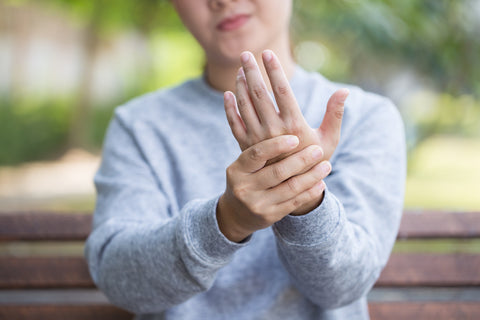 Eucalyptus oil is both an anti-inflammatory and an analgesic so it helps to soothe both the inflammation and pain that is associated with conditions such as rheumatoid arthritis, osteoarthritis and even muscle injury.
Eucalyptus oil is both an anti-inflammatory and an analgesic so it helps to soothe both the inflammation and pain that is associated with conditions such as rheumatoid arthritis, osteoarthritis and even muscle injury.
In fact a 2013 study conducted to investigate the "effects of eucalyptus oil inhalation on pain and inflammatory responses after total knee replacement" suggested that, "inhalation of eucalyptus oil was effective in decreasing patient's pain and blood pressure following TKR." So if you have knee pain, eucalyptus oil can help you find effective relief.
Many popular over-the-counter ointments for joint pain actually contain eucalyptus essential oil as an active ingredient.
How to use eucalyptus oil for joint pain and arthritis:
The cooling sensation of eucalyptus oil combined with peppermint oil (another analgesic) helps alleviate discomfort and offers effective pain relief. When you feel stiffness and pain rub the following blend into your joints:
8-10 drops eucalyptus oil
8-10 drops peppermint oil
3-5 teaspoons carrier oil, such as olive oil or moringa oil (Moringa oil is recommended as a study showed that it is a potent anti-inflammatory, making it an excellent carrier oil for relieving painful, arthritic joints).
Combine all of the above and store away from direct sunlight (preferably in a dark, glass bottle). Rub into aching joints and feel instant, cooling pain relief.
12. Eucalyptus Oil for Muscle Pain
 Have sore muscles or suffered a muscle injury? Eucalyptus oil can help. Similar to the pain-relieving effects the oil has on joint pain, the anti-inflammatory and analgesic effects of the oil are also especially helpful when it comes to soothing tired, aching muscles.
Have sore muscles or suffered a muscle injury? Eucalyptus oil can help. Similar to the pain-relieving effects the oil has on joint pain, the anti-inflammatory and analgesic effects of the oil are also especially helpful when it comes to soothing tired, aching muscles.
Also since eucalyptus oil is a natural vasodilator, it helps to widen blood vessels and improve blood circulation encouraging a free flow of blood to the muscles.
How to use eucalyptus oil for muscle pain:
1. Massage Oil: Combine 5-7 drops of eucalyptus oil to 1-2 teaspoons of a carrier oil, such as jojoba, olive, or moringa oil (known to have strong anti-inflammatory properties) and massage into the muscles.
2. Hot Bath: Add 20-30 drops of eucalyptus oil to a hot bath. The hot water promotes muscle relaxation and the eucalyptus oil gives a tingling, cooling effect and helps to loosen stiff, aching muscles.
3. Spray: In a small spray bottle of water add 15-20 drops of eucalyptus oil. Spray and rub into sore muscles until the cooling feeling turns into a nice warm sensation. This is also a great way to warm muscles and prepare them prior to an exercise session.
13. Eucalyptus Oil for Sinus
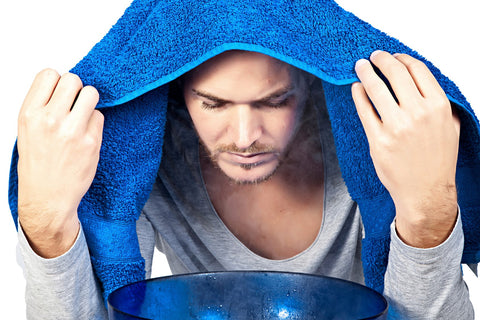 There's nothing like the clogged-head congested feeling of a sinus infection - you can't breathe, possible can't taste food, and your head feels like it's about to explode. Essential oils like eucalyptus are excellent for reducing inflammation of the mucous membranes, thinning mucous in the sinus cavities and opening up the airways to help you find relief from blocked sinuses.
There's nothing like the clogged-head congested feeling of a sinus infection - you can't breathe, possible can't taste food, and your head feels like it's about to explode. Essential oils like eucalyptus are excellent for reducing inflammation of the mucous membranes, thinning mucous in the sinus cavities and opening up the airways to help you find relief from blocked sinuses.
A 2004 study showed how eucalyptus oil improved symptoms in patients experiencing non-bacterial sinusitis. Eucalyptus oil has antifungal, antiviral and antimicrobial properties and is proven to be effective against, "colds, influenza, other respiratory infections, rhinitis, and sinusitis," according to this 2010 study.
How to use eucalyptus oil for sinus congestion:
1. Breathe directly: Put 1-2 drops of eucalyptus oil onto a handkerchief and breathe in for an instant feel good sensation
2. Steam Inhalation: Add 5 drops of eucalyptus oil and 5 drops of peppermint oil to a bowl of boiling water. Place a large towel over your head (to keep the steam in) and breathe in the strong vapors for 10 minutes or until the steam dies down. The hot steam and medicinal properties of both oils help to liquefy mucus and drain the airways. Blow your nose ever so often to drain the nasal passages and feel relief. Repeat every 3-4 hours.
3. Warm compress: Fill a bowl with 1-2 cups of hot tap water (never boiling water!) and add 1-2 drops of eucalyptus essential oil and swish around using a soft wash cloth. Wring it out completely. Lie down on your back and drape the washcloth over your nose and mouth (be careful not to get it in your eyes). Inhale deeply. The moisture from the water helps to get the mucous flowing and relieve congestion.
14. Eucalyptus Oil for Asthma
Do you or a loved one suffer from asthma? Shortness of breath, chest tightness, coughing and difficulty breathing are all the tell-tale signs that asthma sufferers can identify with. The condition affects millions of people world-over and doctors usually prescribe inhalers with beta agonists and anticholinergics to effectively treat the condition.
So how can eucalyptus essential oil help soothe asthma symptoms? Since asthma causes inflammation in the airway walls (the airways thin, tighten and more mucus is produced), eucalyptus essential oil helps to widen the blood vessels, so that more oxygen can get into the lungs. The oil is also a natural anti-inflammatory, helping to thin and loosen mucous so it can be coughed up more easily, facilitating easier breathing and much needed relief. Another study suggested that 1,8 cineole, the active ingredient in Eucalyptus oil, promotes anti-inflammatory activity when treating bronchial asthma.
How to use eucalyptus oil for asthma:
1. Chest Rub: Blend 2-3 drops of eucalyptus essential oil with 1 teaspoon carrier oil, such as olive oil or jojoba oil and massage onto the chest. The strong aroma and soothing sensation will help open up the blood vessels and let more oxygen into the lungs for easier breathing.
2. Steam Inhalation: Add 5 drops of eucalyptus oil to a bowl of hot water. Place a towel over your head and breathe in the steam. The eucalyptus-infused steam helps to dilate blood vessels in the airways, loosen mucus and relax spasms in the lungs.
Word of Caution: Although eucalyptus oil's medicinal properties can be quite effective, it may not be a good fit for every asthma patient and the aroma of the potent oil might even trigger an asthma attack with those who are extremely sensitive to smells. Asthma is an incurable ailment and is dangerous if left untreated. It is best to consult with your doctor before you start to use eucalyptus oil for relieving asthma symptoms.
15. Eucalyptus Oil for Building Immunity
 There's no doubt that diet, sleep and an overall health-conscious lifestyle are primary factors for a healthy immune system, however a 2008 study suggested that eucalyptus oil can be very effective in boosting the immune system by stimulating immune response on the cellular level.
There's no doubt that diet, sleep and an overall health-conscious lifestyle are primary factors for a healthy immune system, however a 2008 study suggested that eucalyptus oil can be very effective in boosting the immune system by stimulating immune response on the cellular level.
Another study indicated that eucalyptus essential oil promotes phagocytic activity (stimulates white blood cells to ingest foreign particles), which helps in improving immunity. The anti-inflammatory and antimicrobial properties of eucalyptus oil are well-known for treating the symptoms of many respiratory conditions such as cold, cough, sinusitis, influenza, bronchitis and more.
How to use eucalyptus oil for boosting immunity:
1) Diffuse: When flu season is around the corner or someone in the house is under the weather, prepare yourself by diffusing a few drops of eucalyptus oil in your diffuser and letting the healing vapors waft through the entire house benefiting everyone.
2) Steam Inhalation: If you feel a cold coming on, inhaling a warm steam by combining some hot water and a few drops of eucalyptus oil with a towel over your head, can help control congestion and stop a cold from turning into a full-blown infection.
3) Hand Sanitizer: One of the best ways to avoid getting a bug is to wash your hands. For a chemical-free hand sanitizer that you can keep in your purse, fill a small mist-spray bottle with distilled water and 10 drops of eucalyptus oil, 5-7 drops of lavender essential oil and 5-7 drops of tea tree essential oil. Shake gently and spray!
16. Eucalyptus Oil for Skin
 Eucalyptus essential oil has many innate properties that make it an excellent choice for treating many skin conditions. It is a natural antiseptic with antifungal, antiviral, anti-inflammatory and antibacterial properties making it highly effective in treating wounds, minor cuts, acne, boils, insect bites, skin infections and more.
Eucalyptus essential oil has many innate properties that make it an excellent choice for treating many skin conditions. It is a natural antiseptic with antifungal, antiviral, anti-inflammatory and antibacterial properties making it highly effective in treating wounds, minor cuts, acne, boils, insect bites, skin infections and more.
1,8 cineole, one of the active ingredients in eucalyptus oil, is known for its anti-bacterial properties. Research published by the University of Maryland listed the many benefits of eucalyptus oil and included the benefits it had on the skin by stating, "on the skin, eucalyptus oil has been used to treat arthritis, boils, sores, and wounds."
How to use eucalyptus oil for skin:
1. Natural sunscreen: Eucalyptus oil has a natural SPF 3, and when combined with olive oil with SPF 8 it can make a natural moisturizing sunscreen.
2. Chemical-free moisturizer: Mix 3-5 drops of eucalyptus oil with 1 tablespoon jojoba oil olive oil or sweet almond oil and massage into the skin. This helps to rejuvenate and soften the skin. Great if you have dry, itchy skin!
How to use eucalyptus oil for treating wounds:
Antiseptic cleaner: For minor cuts, wounds and boils mix 1 teaspoon of apple cider vinegar with 5-7 drops of eucalyptus oil and dab with a clean cotton ball.
17. Eucalyptus Oil for Skin Fungus
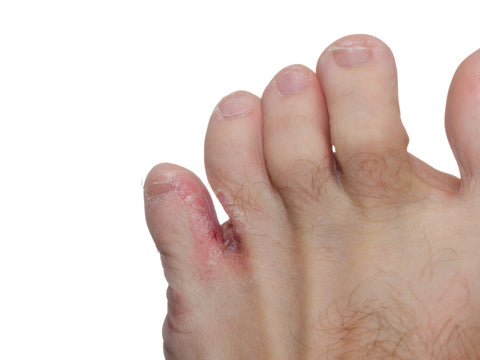 Have an annoying itch that refuses to go away? You might have a fungal infection. Spread by spores, fungal infections can be contagious and some of the most notorious ones include ringworm, jock itch, athlete's foot, onychomycosis (destruction of fingernails and toes), thrush and more.
Have an annoying itch that refuses to go away? You might have a fungal infection. Spread by spores, fungal infections can be contagious and some of the most notorious ones include ringworm, jock itch, athlete's foot, onychomycosis (destruction of fingernails and toes), thrush and more.
Eucalyptus oil is a natural anti-fungal and studies including a 2015 study indicate that when used topically for treating fungal infected toenails and superficial onychomycosis, it may "provide an acceptable and cheaper alternative to prescription topical antifungal agents."
How to use eucalyptus oil for fungal infections:
1. Cool Compress: Fill a bowl with 1 cup of cold water and add 3 drops of eucalyptus essential oil and 3 drops of tea tree essential oil (another natural fungicidal) and swish around using a soft wash cloth. Wring it out and apply it to the affected area. For more effective relief soak a gauze in the solution, squeeze out the extra liquid and wrap it around the area lightly. Leave overnight.
2. Athlete's foot wash: Soak the affected foot for 15-20 minutes in a solution of warm water combined with 1/2 a cup of Epsom salts and 1 teaspoon of eucalyptus oil. Do this twice a day for best results.
3. Nail infections: Combine 2-3 drops eucalyptus oil with 1 teaspoon olive oil. Dab and soak a cotton ball in the blend and apply it on the infected nails, really rubbing it in. Repeat 2-3 times a day.
18. Eucalyptus Oil for Acne
 Eucalyptus oil helps in destroying bacteria clogging the pores and preventing it from spreading, making it an excellent natural treatment for acne. As an antibacterial and anti-inflammatory the oil not only helps to kill bacteria, but also to dry the blemished area and provide healing relief to irritated skin.
Eucalyptus oil helps in destroying bacteria clogging the pores and preventing it from spreading, making it an excellent natural treatment for acne. As an antibacterial and anti-inflammatory the oil not only helps to kill bacteria, but also to dry the blemished area and provide healing relief to irritated skin.
How to use eucalyptus oil for acne:
1. Acne blemishes: Mix 1 drop eucalyptus essential oil with 3 drops of water. Soak a cotton swab in the blend and apply liberally to pimples and oily areas of the face. Make sure the solution does not get in the eyes, mouth or nose. Leave overnight for optimum results.
2. Use under makeup: Add 2-3 drops of the oil in your daily face moisturizer.
3. Acne boils and cysts: Combine 1 drop eucalyptus oil with 3 drops of apple cider vinegar. Dab a cotton swab in the blend and apply on the affected area. The solution dries out the blemishes and helps the infection clear. Leave overnight for best results.
19. Eucalyptus Oil for Cleaning and Deodorizing
 Eucalyptus oil is a natural anti-bacterial making it a powerful germ cleaner and a terrific grease buster. Being an anti-fungal, it's also excellent as a deodorizer. It works wonders for general household cleaning and disinfecting, diminishing musty smells, cleaning the bathroom, shower, kitchen counters, floor and more.
Eucalyptus oil is a natural anti-bacterial making it a powerful germ cleaner and a terrific grease buster. Being an anti-fungal, it's also excellent as a deodorizer. It works wonders for general household cleaning and disinfecting, diminishing musty smells, cleaning the bathroom, shower, kitchen counters, floor and more.
How to use eucalyptus oil for cleaning:
1. Antibacterial Cleaning Spray: For a natural home-made disinfectant mix 1 1/2 cups water with 1/2 cup of vinegar, and 20-25 drops of eucalyptus oil. Fill in a spray bottle (16oz. works great) and use for general cleaning of kitchen and bathroom sinks and countertops, spraying and mopping floors and as a natural air freshener.
2. Chemical-Free Grease Remover: Add two teaspoons of eucalyptus essential oil and 1 tsp of dish washing liquid to a 16oz. spray bottle filled with water. Shake gently and spray onto greasy, grimy kitchen countertops, spray and clean the microwave oven, or scrub and shine the kitchen sink.
3. Natural Mold-killer: To prevent mold build up in the shower, mix 5-7 drops of eucalyptus essential oil and tea tree essential oil (another natural fungicidal) in a spray bottle filled with 2 cups of water (16oz. bottle works well) and spray your shower with this solution after use. Also great for cleaning the fridge. Smells great as well!
4. Instant Deodorizer: Add 5-7 drops of eucalyptus oil to 2 cups of hot soapy water and use to deodorize things around the house like the garbage can and toilet bowl. Dabbing 1-2 drops on your hanging room or car air freshener will instantly help revitalize it. You can also add a dab of lime essential oil or grapefruit essential oil for a fresh citrus aroma.
5. Dust-mite Killer: The next time you wash your towels, blankets, pillows and bed linen add 1-2 teaspoons of eucalyptus oil to your washing machine before starting your washing cycle. Great for removing musty smells too and inhibiting moths and silverfish.
6. Stain Remover: To remove grease marks, spots and stains from clothing, add a few drops of eucalyptus oil straight to the soiled area and leave for 3-5 minutes. Wash normally.
7. Adhesive Eliminator: Apply eucalyptus oil directly on glass to remove sticker and decal residue left behind from sticky adhesives. Leave for 30 seconds and scrub off.
20. Eucalyptus Oil for Stress
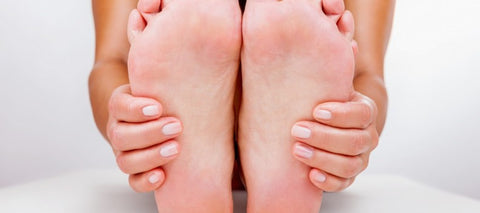 Eucalyptus oil is an excellent pick-me-up when you're feeling tired and exhausted. It's potent aroma is great for stimulating both the mind and the body.
Eucalyptus oil is an excellent pick-me-up when you're feeling tired and exhausted. It's potent aroma is great for stimulating both the mind and the body.
How to use eucalyptus essential oil for stress:
1. Diffuse: Add a few drops of eucalyptus oil and a few drops of peppermint oil to your diffuser and let the clarifying, minty aroma waft through the air and refresh your senses.
2. Inhale Directly: For those situations where you need an instant pick-me-up (like that lazy afternoon at work where you just can't keep your eyes open), take a deep breath directly from the bottle for instant eye-opening refreshment.
3. Apply topically: Rub a few drops directly on your wrists, under the feet and into your temples and let the cooling effect invigorate your mind.
Side Effects and Warnings
Essential oils are natural but powerful. Some people may develop an allergic reaction to any oil so it's always best to try a little by doing a small skin patch test on your arm or leg (never your face or neck) to make sure you don't have an adverse reaction.
If you're pregnant or nursing, or on any kind of medication please check with your doctor before using essential oils.
What to Look for When Buying Essential Oils?
When buying essential oils make sure the bottle says 100% pure essential oil, and has the proper name of the species mentioned on the label of the bottle. Example for Eucalyptus: (Eucalyptus Globulus). If you see the word 'fragrance' it almost always means there are other additives.
Ideally it's always best to buy essential oils from an organic source that are labeled as "Therapeutic grade," meaning they are free of toxins and chemicals and are unfiltered and undiluted.
Also beware of genetically modified ingredients and choose Non GMO essential oils.
Last Words
Any natural therapy that can help calm the mind and nerves can help to relieve stress and anxiety. There is no fixed recipe when it comes to essential oils and what might work for you might not work for someone else. Since we are all biochemically exclusive, it's best to experiment with a variety of essential oils, pay attention to your body, and find the "personal blends" that work most optimally for you.
Back to you! What’s your experience with using eucalyptus essential oil? What are your favorite blends? We'd love to hear what you have to say!


Comments (1)
Michael Clawson on December 29, 2019
just getting into oils, most interested, someone gave me eucalpytus for sinus, not tried, going too. thanks
Back to Blog